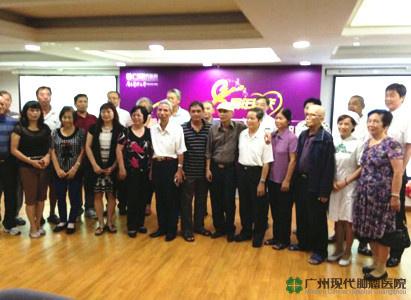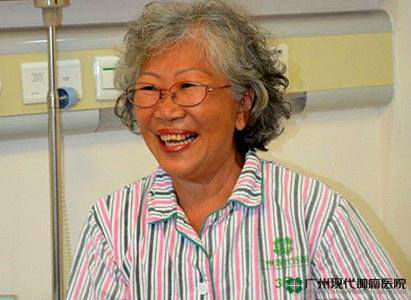Filtered By: Cbb
Community Bulletin Board
Seeking treatment abroad, why go far away from home?
As Guangzhou’s economy develops, its cultural and regional inclusiveness increases. More and more foreigners choose to work, take up long-term or even permanent residence in the province. In recent years, there have been many foreigners who know about medical technologies in China flying to Guangzhou to see a doctor.

Patients from Indonesia, Vietnam, Philippines, Bangladesh and Thailand shared their experiences of seeking treatments in Guangzhou during the first Modern International Medical Exchange Day.
During the first "2013 Modern International Medical Exchange Day” held on August 8, patients from Indonesia, Vietnam, Philippines, Bangladesh and Thailand shared their experiences of seeking treatments in Guangzhou.
They told us how they tackled problems like physical discomfort, unfamiliar environment, language barrier, cultural contrary and loneliness, as well as how they overcame their illness with the encouragement and help from medical staff in Guangzhou.
Many hospitals including Modern Cancer Hospital Guangzhou have organized international medical service teams for overseas patients and opened up “green channels” for their treatment. Some experts say that advanced medical technologies and equipments can help patients control and eradicate diseases.
If there can be more opportunities like exchange day for doctors and patients, caring groups and patients to share and exchange, it will be very helpful for patients to get rid of fear, maintain a good state and improve quality of life and extend patients life. It will also be very good for treatment and rehabilitation.
Survey: foreigners receiving treatments in Guangzhou increase by 20 percent yearly
“As far as our hospital is concerned, everyday we have overseas patients coming here to consult or receive treatments. Most of them know us from their friends, some from our overseas offices and some find us after reading reports on Chinese medical technologies,” said Wang Huaizhong, president of Modern Cancer Hospital Guangzhou.
According to him, every year the hospital receives about 10,000 outpatients and 7000 inpatients. And 90 percent of inpatients are from Southeast Asia countries. “Take the Oncology Department as an example, most of its patients are from regions outside of China, including Vietnam, Indonesia, Philippines, Cambodia, Bangladesh, Thailand, Malaysia, European and American counties.”
According to Wang Huaizhong, it is obvious that since hosting the Asian games, more and more foreigners come to Guangzhou to receive treatments. “The number of patients the hospital receives has a 20 percent yearly increase.”
In order to meet market needs and show the hospital’s humanistic concern, the hospital set up the International Affairs Department and Translation Department in 2006. The international service team provides convenience for overseas patients to seek treatments. Moreover, there are more than 10 special value-added services like regular lectures, central business centers, and outdoor tours.
On August 8, Modern Cancer Hospital Guangzhou specially carried out the First Modern International Medical Care Exchange Day 2013 in the name of the 8th anniversary. They invited “Modern Cancer Fighters” who have been treated in this hospital, “Modern Health Ambassadors” and several volunteer groups in Guangzhou to share and exchange. “We hope that this opportunity can boost patients’ confidence to treat the disease and help them experience the good cultural atmosphere in Guangzhou.”
Cases: enjoying Chinese medical service of treating both the body and the mind in Guangzhou
On the exchange day, more than 100 patients from Vietnam, Indonesia, Philippines, Cambodia, Bangladesh, Thailand, and Malaysia communicated with Modern Health Ambassadors and shared their experience of seeking treatment in Guangzhou. Baiyun Mountain Singing Group, a voluntary art group in Guangzhou also showed overseas patients their regards and care for them and gave dance and musical performances that they themselves directed.
“China has a higher level of medical technologies than Vietnam, so many Vietnamese tend to come to China for treatment. Besides, China owns the mysterious TCM such as Chinese medicine recuperation, acupuncture and massage. We all want to have a try for that.” Luo Siming, a patient from Thailand said. Most overseas patients come to Modern Cancer Hospital after knowing about the hospital from either their friends or the hospital’s foreign offices, and after reading reports on medical technology in China.

Wang Youhua shares her experience during exchange day.
Ms. Wang Youhua, an overseas Chinese from Indonesia was diagnosed with right breast invasive ductal carcinoma two years ago in Modern Cancer Hospital Guangzhou and received treatment here. As her condition improved, she was discharged. Now her condition is good. During the exchange day, she was vigorous and smiled happily. “In June, my husband and I came back from our trip to Xinjiang and Inner Mongolia. Now I am in a very good condition. In Indonesia, people say I don’t look like a cancer patient at all.”
Vice-President of Modern Cancer Hospital Guangzhou Chen Bing who is in charge of medical affairs said, “as medicine develops, many disease can be treated with multiple means and some diseases regarded as serious in the past can be controlled or even cured. Those real patients around us who recover well and begin a fresh life after timely treatment sharing experience can help other patients cheer up and get rid of fear gradually, which is very beneficial for receiving treatment and rehabilitation.”
Appeal: provide easy medical environment for overseas patients
Foreigners encounter many embarrassing situations when they want to see a doctor in Guangzhou. As they are not familiar with public hospitals in China, they will first call an insurance company to find a hospital instead of calling 120 if an emergency like an injury occurs. Insurance companies usually provide them with hospitals only for foreigners which are very expensive if a patient doesn’t have insurance. Besides, there won’t necessarily be an interpreter for some minority languages. There are communication problems, too, if foreigners register at an ordinary hospital because of minor ailments.
On the exchange day, many foreign patients also told us about their own or friends’ tortuous experiences of seeing a doctor in China and hoped that people pay attention to this situation and provide convenience for their medical treatment. In this regard, Chen Bing thinks that they have to meet higher requirements on doctors’ and nurses’ skills, equipments and services when treating foreign patients. “Medicine has no boundaries. We offer better medical technologies and services; meanwhile we should provide overseas patients with an easy medical environment which is an important task in improving the hospital.
Press release and photos from Modern Guangzhou Hospital
More Videos
Most Popular



